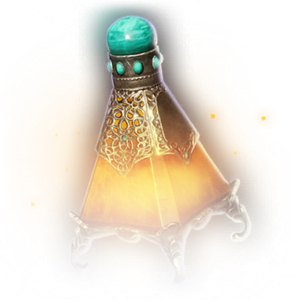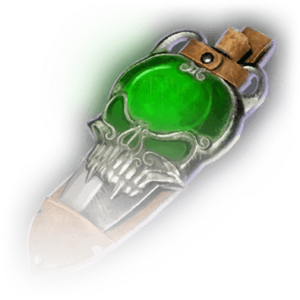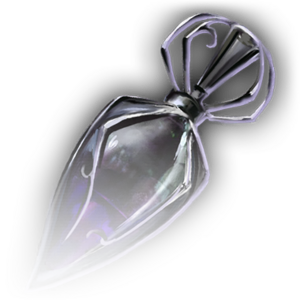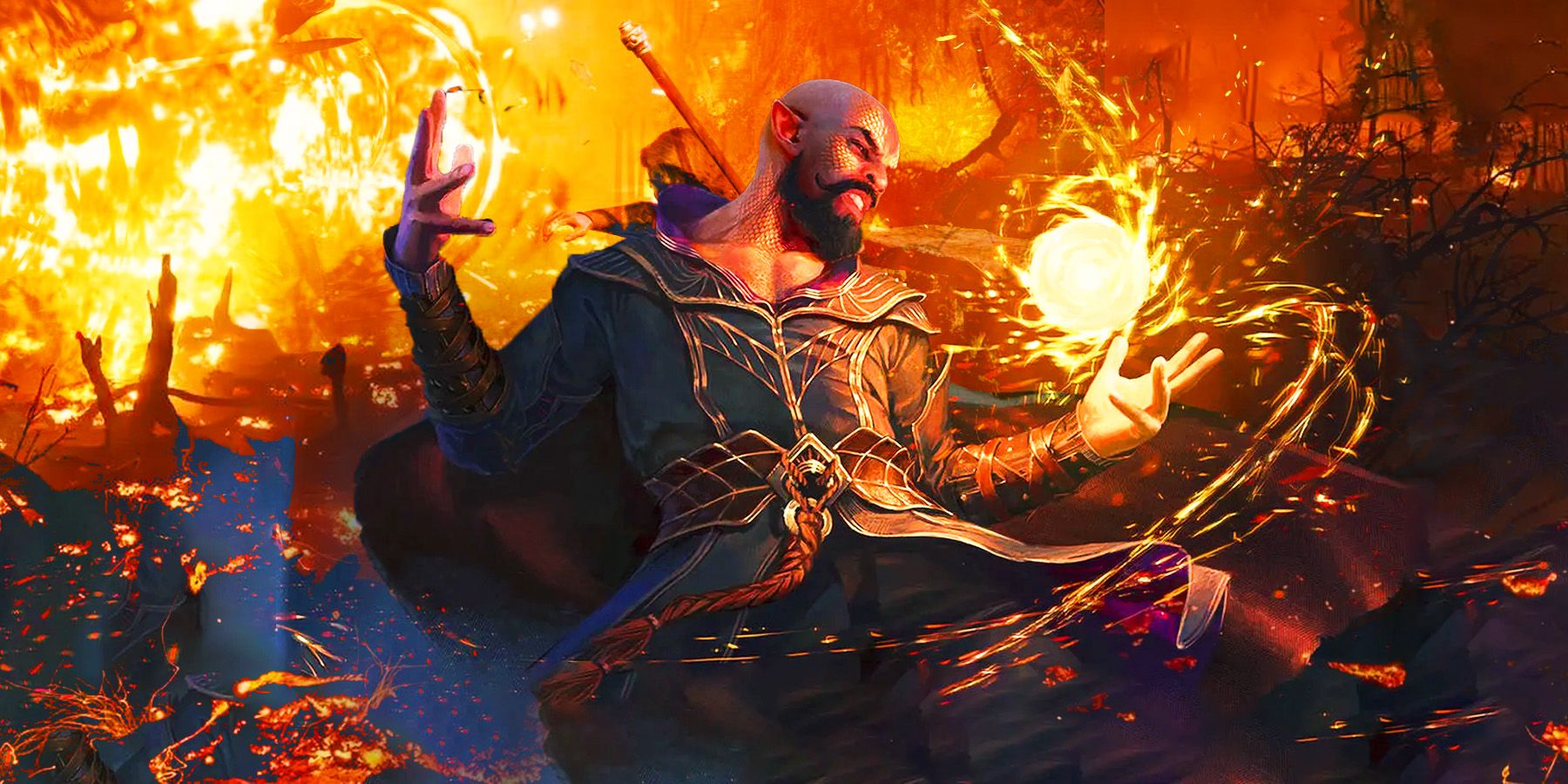Bringing a tabletop game to another medium is no mean feat, but Baldur’s Gate 3 has successfully adapted many aspects of Dungeons & Dragons 5th Edition to create a fantastic and complex RPG. Alongside the spells, magic items and ability scores are status conditions lifted straight from D&D‘s Player’s Handbook. Not everyone has played D&D prior to loading up BG3 for the first time, however, leading to a little confusion for some.
Status conditions can be triggered in a few different ways, with some being imposed by spells, while others rely on the environment around the players to take effect. Conditions in BG3 cover a range of situations, and while some can be beneficial, others can seriously impact the team in combat. There are some great status effects in Baldur’s Gate 3, and these are some of the most common people will encounter.
15 Blinded – Significantly Affects Attack Rolls
Caused By Spells, Familiars & Environmental Effects
Blinded is a fairly straightforward condition that limits a character’s ability to see, which in turn affects them negatively in battle. Blinded targets have the reach of their ranged attacks and ranged spells significantly reduced to only three meters/10 feet. All their attack rolls will be at disadvantage, while attacks against them have advantage.
Wildheart barbarians with Aspect of the Beast: Chimpanzee can fling camp supplies at targets to blind them.
Blinded can be inflicted by spells such as Sunbeam, ![]() Colour Spray, and of course,
Colour Spray, and of course, ![]() Blindness, as well as raven familiars or Wild Shapes. There are also environmental conditions that will inflict Blinded, such as fog or darkness.
Blindness, as well as raven familiars or Wild Shapes. There are also environmental conditions that will inflict Blinded, such as fog or darkness.
14 Charmed – Prevents Attacks On Caster
Caused By Spells, Illithid Powers & Class Actions
Charmed is a classic D&D status, the result of being enchanted by a spellcaster. While charmed, targets cannot attack the caster and the caster has advantage on Charisma checks in dialogue. The most common way for a character to become Charmed is by using ![]() Charm Person against them.
Charm Person against them.

Related
Baldur’s Gate 3: Best Level One Spell For Each Spellcasting Class (& The Worst For Each)
Baldur’s Gate 3’s most powerful spells are typically reserved for higher levels, but some first-level options stand out, while others flounder.
However there is also Tadpole Charm, an illithid power in BG3, that can be used as a reaction. Spells such as ![]() Calm Emotions and
Calm Emotions and ![]() Protection from Evil and Good give immunity from being Charmed, along with
Protection from Evil and Good give immunity from being Charmed, along with  Elixir of Peerless Focus and fey ancestry.
Elixir of Peerless Focus and fey ancestry.
13 Entangled/Enwebbed – Prevents Movement & Gives Enemies Attack Advantage
Caused By Environmental Effects & Spells
Entangled and Enwebbed are two separate conditions that will have the same effect on targets, be they the enemy or the party. When Entangled/Enwebbed. the target can’t move, and their Dexterity saving throws will be at disadvantage. However, the more dangerous aspect for trapped targets is that all attack rolls against them will be at advantage.
Entangled is triggered by spells such as ![]() Entangle and areas covered by twisting vines. Enwebbed is caused by coming into contact with webs, either those created by spells or crafted by spiders throughout the game.
Entangle and areas covered by twisting vines. Enwebbed is caused by coming into contact with webs, either those created by spells or crafted by spiders throughout the game.
12 Frightened – Terrible For Melee Attackers
Caused By Spells, Class Actions & Certain Enemy Actions
Frightened is a particularly annoying condition when used against the party, as it makes any fight immediately harder than it needs to be. Frightened targets can’t move, but even worse, they will also have disadvantage on their attack rolls and ability checks.
There are tons of spells in BG3 that can cause fear, such as ![]() Dissonant Whispers and wrathful smite, but there are also certain enemies that utilize features that inflict the Frightened condition. This is most notable in the battle with Viconia in the House of Grief with her various Mapped Terror spells.
Dissonant Whispers and wrathful smite, but there are also certain enemies that utilize features that inflict the Frightened condition. This is most notable in the battle with Viconia in the House of Grief with her various Mapped Terror spells.
11 Bleeding – Small Damage Over Time
Caused By Weapon Actions, Grenades & Certain Passive Features
Bleeding is a condition that at first doesn’t seem to have much of an effect but can quickly add up in tough fights, both in the party’s favor and against it. Bleeding is typically inflicted by weapon actions, but thrown items such as shrapnel grenades and spiked bulbs will also cause bleeding.
Bleeding targets take two slashing damage at the start of their turn for the duration. However, the most dangerous aspect of Bleeding for the party is that it imposes disadvantage on Constitution saving throws, which can spell disaster for concentrating spellcasters.
10 Poisoned – Disadvantage On Ability Checks & Attacks
Caused By Spells, Creatures & Poisoned Items
As one might expect, the Poisoned condition occurs when a character comes into contact with a poisoned item, substance, or venomous creature. Spider familiars and Wild Shapes are a great source of consistent poison damage, as is the spell ray of sickness.

Related
Baldur’s Gate 3: 10 Most Underwhelming Spells (& How They Can Be Fixed)
Baldur’s Gate 3 has many powerful spells to choose from, but a few are vastly underpowered and need to be buffed. Here are a few great examples.
Poisoned will also impose disadvantage on all attack rolls and ability checks for the duration, making it effective both in and out of combat. Weapons can also be poisoned using the various poisons found throughout BG3, such as the  Wyvern Toxin given in Act 1 or
Wyvern Toxin given in Act 1 or  Drow Poison that can be crafted.
Drow Poison that can be crafted.
Caused By Certain Items
Not all conditions are negative, and Wrath is very useful for the party, particularly melee fighters. Wrath is gained by wearing certain equipment that can generate Wrath under specific conditions. For example, the ![]() Bloodguzzler Garb lets the wearer gain Wrath for two turns whenever they are damaged by an enemy.
Bloodguzzler Garb lets the wearer gain Wrath for two turns whenever they are damaged by an enemy.
While the character has Wrath, they will gain a plus one bonus to damage with melee weapons every turn. The amount of turns Wrath will be active will stack based on items worn and actions taken, such as dashing with the Linebreaker Boots.
8 Chilled – Vulnerability & Resistance To Damages
Caused By Weapon Passives & Class Actions Of Particular Enemies
Chilled is a condition the party will only rarely come across with enemies but can use to their own advantage with the right equipment. The best way is to find the Mourning Frost staff in BG3‘s Act 1, which enhances the wielder’s cold damage.
Chilled makes the affected target even more vulnerable to cold damage, at the expense of making them resistant to fire damage. However, Chilled is best used in a combo with water, as making Chilled targets wet will freeze them solid, preventing them from taking actions or reactions.
7 Wet – Vulnerability & Resistance To Damages
Caused By Environmental Effects, Spells & Items
Speaking of Wet, this condition has a similar effect on targets as chilled with a little extra. Targets can obviously become wet after being doused in water, which can come from spells such as ![]() Create or Destroy Water or simply from bottles/barrels of water.
Create or Destroy Water or simply from bottles/barrels of water.

Related
One Of BG3’s Smallest Features Has The Biggest Impact
Floor hazards caused by elemental attacks are some of the more interesting mechanics in Baldur’s Gate 3 that can really only work in a video game.
Wet targets are resistant to fire damage, but become vulnerable to cold and lightning damage. Wet can be used to great effect by the party by creating water over an area to douse the enemy and then using lightning spells or arrows to electrify the puddle.
6 Paralyzed – Prevents Movement, Affects Saving Throws & Attack Auto Succeed
Caused By Spells, Weapon Actions & Item Passives
Paralyzed is an awful condition to be hit within BG3, as it not only causes party members to miss their turn but also leaves them defenseless in combat. Targets affected by Paralyzed can’t move or take actions, bonus actions, or reactions.
They will automatically fail all Strength or Dexterity saving throws, which makes them vulnerable to AOE effects. However, the worst aspect is that all attack rolls made against them will automatically succeed, and any made within three meters/10 feet will be automatic crits, which can easily devastate the party in the game’s hardest boss fights.
5 Reeling – Penalty To Attack Rolls
Caused By Item Passives
Reeling is another condition more likely to be inflicted on enemies by the party, as the primary source for the condition in BG3 is from the powerful Adamantine Forge items. Reeling imposes a minus one penalty to the affected target’s attack rolls for the duration.
However, each time the effect is triggered, it will reapply, which allows the number of turns Reeling is active for to stack. While minus one might not sound like much, it can be potent when combined with other effects like ![]() Bane or other items that activate when an enemy misses.
Bane or other items that activate when an enemy misses.
4 Silenced – Can’t Cast Spells
Caused By Spells, Class Actions & Weapon Passives
Silenced is a condition that’s fantastic to use against enemies and deeply frustrating when turned on the party. Silenced means that those affected are unable to speak, which will prevent them from casting any spells with verbal components.
The only plus to becoming Silenced is that it makes the target immune to thunder damage, but that is highly situational. The most common source is the ![]() Silence spell, but the Sussur Masterwork weapons are also great for the party to keep on hand, as they will also silence on a hit.
Silence spell, but the Sussur Masterwork weapons are also great for the party to keep on hand, as they will also silence on a hit.
3 Stunned – Prevents Movement & Affects Saving Throws
Caused By Spells, Illithid Powers, Class Actions & Item Passives
Stunned acts in a similar way to Paralyzed, although slightly less disastrous in battle, and is far more common throughout BG3. Stunned targets can’t move, or take actions, reactions, or bonus actions. Just as with Paralyzed, Stunned targets will also automatically fail all Strength and Dexterity saving throws putting them in danger during AOE attacks.

Related
This Incredible Baldur’s Gate 3 Swords Bard Build Is An Absolute Essential If You’re Trying Out Your Very First Honour Mode Run
One Baldur’s Gate 3 Swords Bard fan build makes Honour mode much more fun and manageable, and is perfect for veterans or first timers.
Finally, all attack rolls against stunned targets will have advantage, although thankfully, will not be auto crits. Luckily there are some powerful items in BG3 that make the wearer immune to being Stunned such as the ![]() Helm of Balduran.
Helm of Balduran.
2 Prone – Deadly & Costly In Battle
Caused By Attack Actions, Environmental Effects & Spells
Prone occurs when a creature is knocked down off its feet, and although the condition doesn’t sound dangerous, it can potentially be deadly in the wrong situations. This is because all attacks made within three meters/10 feet of the prone target will have advantage.
Ice and grease are perhaps the most common and quickest ways to disrupt an area, knocking enemies Prone and imposing difficult terrain.
Prone is also costly for those affected as it will take half their movement speed just to stand and, while Prone, they can’t move or take actions, bonus actions, or reactions. Things get even worse for spellcasters, as being knocked Prone instantly ends concentration spells.
Caused By Environmental Effects, Spells, Weapon Effects & Item Passives
Burning is a pretty self-explanatory condition that causes affected targets to take 1d4 fire damage each turn for the duration. Getting rid of Burning is fairly easy as it can be removed by using a healing potion, getting wet, or another party member using the help action.
Burning is one of the most common conditions, as there are so many ways to become affected with the vast number of fire spells and weapon passives in Baldur’s Gate 3. Alchemist’s Fire is also a significant source, and fire is generally one of the more common environmental effects.

- Released
- August 3, 2023
- Developer(s)
- Larian Studios
- ESRB
- M for Mature: Blood and Gore, Partial Nudity, Sexual Content, Strong Language, Violence
- Platform(s)
- PC , macOS , PS5 , Xbox Series X




